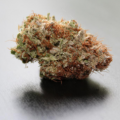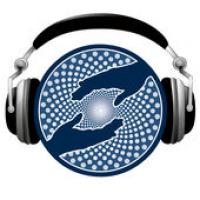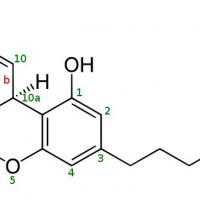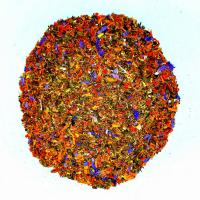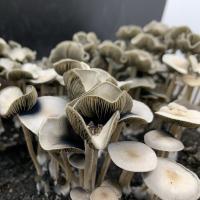April 4, 2021
Category: Other Psychedelics
264 views
I had a surgery last week. I got to chat with the anesthesiologist while the operating table before he administred general anesthesia. He listed many of the contents in it for me, and I said, "Nothing dissociative?" He said, "You want ketamine?" I nodded. He asked, "Have you been sad?" I nodded and said I'm good to go for ketamine, so he told his assistant to add 25 mg Ketamine to my general anesthesia cocktail. I don't remember tripping. I don't think I would have at such a low dose. My surgeon said I had a nightmare or an episode when waking up - I started fighting them and 6 people had to hold me down. They injected ultrafast profanol and it worked for 10 seconds, but I woke up and started fighting again so they held me down again and then administred intravenous Ativan. Apparentely that did the trick, but I got some bruising as a result. I scared them in the operating room, lol. My surgeon asked if I remember anything about it. I didn't. He wasn't aware of the ketamine added to the mix. I was under general anesthesia once before (no ketamine) and I apparentely fought during the procedure (resistant to a scope, according to the doctor back then). I don't know if my reaction after this latest surgery was from profanol, general anesthesia, or ketamine... But after the surgery, I was in high spirits and I have been pretty positive for the past week since. One day, when I can afford it, I'd like to go to a ketamine clinic. Now, I'm using microdoses of mushrooms to try to keep the ketamine going.
I asked for Ketamine because a friend who gave birth (c-section) said she got it and she tripped - in a place with no judgement, no harm. She felt her depression was partly lifted.
January 30, 2021
Category: Psilocybin
167 views
What's it like to microdose?
It's mostly physically imperceptible, and if you physically feel it, lower the dose. You know it's working because your thoughts, preferences, and attitude changes.
Here's a good example:
Earlier last week, I woke up from a nightmare. I lost my cats. I was in fist fights. My family was fucking with my head. My brother wanted to smash my face in. My father ignored it. My mother was nice for a change, but only because she was dying. With the way dreams are, I had 2 kittens that were stolen from my hands. Then I was paralyzed from the waist down, manifested from emotional overburden.
I woke up feeling haunted and with grief and anxiety. Thank God it was a microdose day. I took a capsule and one hour later I was pondering violence and how it doesn't solve anything. It's a base expression. Love and diplomacy is better. Union. Unification. Setting aside differences, better yet, accepting them as gifts from the universe.
Had it not been for the microdose, it would have been a bad day, colored dark from the start because of a bad dream that was too real. The microdose helped relieve my anxiety through changing my usual reaction and thought patterns.
I did a 10 week Fadiman MD protocol with shrooms and I'm happier. Took a week off and started again yesterday. Mush love.
The Case for Macrodosing
Microdosing, where people take miniscule amounts of substances to change patterns of behavior, has brought psychedelics to the mainstream. But is there more to be gained with a much higher dose?
In a historic vote more than 80 years in the making, the House of Representatives this morning approved the MORE Act, a bill that would end the federal prohibition of cannabis. The bill passed by a vo... View MoreIn a historic vote more than 80 years in the making, the House of Representatives this morning approved the MORE Act, a bill that would end the federal prohibition of cannabis. The bill passed by a vote of 222-163 as of 12:53pm—there are 46 members whose votes have not been registered, but it’s not enough to defeat the bill.https://www.leafly.com/news/politics/history-made-us-house-of-representatives-votes-to-end-federal-marijuana-prohibition?mobile=android&cacheBuster=justOnce
History made: US House of Representatives votes to end federal marijuana prohibition | Leafly
The MORE Act now goes to the Senate, where it's expected to be blocked by majority leader Mitch McConnell.
U.N. Reclassifies Cannabis as a Less Dangerous DrugA United Nations commission voted to remove marijuana for medical use from a list of the most risky narcotics, such as heroin.A United Nations commis... View MoreU.N. Reclassifies Cannabis as a Less Dangerous DrugA United Nations commission voted to remove marijuana for medical use from a list of the most risky narcotics, such as heroin.A United Nations commission voted on Wednesday to remove cannabis for medicinal purposes from a category of the world’s most dangerous drugs, a highly anticipated and long-delayed decision that could clear the way for an expansion of marijuana research and medical use.The vote by the Commission for Narcotic Drugs, which is based in Vienna and includes 53 member states, considered a series of recommendations from the World Health Organization on reclassifying cannabis and its derivatives. But attention centered on a key recommendation to remove cannabis from Schedule IV of the 1961 Single Convention on Narcotic Drugs — where it was listed alongside dangerous and highly addictive opioids like heroin.Experts say that the vote will have no immediate impact on loosening international controls because governments will still have jurisdiction over how to classify cannabis. But many countries look to global conventions for guidance, and United Nations recognition is a symbolic win for advocates of drug policy change who say that international law is out of date.“This is a huge, historic victory for us, we couldn’t hope for more,” said Kenzi Riboulet-Zemouli, an independent researcher for drug policy who has closely monitored the vote and the position of member states. He said that cannabis had been used throughout history for medicinal purposes and that the decision on Wednesday reinstated that status.The change will most likely bolster medical research and legalization efforts around the world.The vote was a “big step forward,” recognizing the positive impact of cannabis on patients, said Dirk Heitepriem, a vice president at Canopy Growth, a Canadian cannabis company. “We hope this will empower more countries to create frameworks which allow patients in need to get access to treatment.”Marijuana for medical use has exploded in recent years and products containing cannabis derivatives like cannabidiol or CBD, a nonintoxicating compound, have flooded the wellness industry. Cowen, an investment and financial services company, estimates that the CBD industry in the United States will be worth $16 billion by 2025.Some research has suggested that CBD can protect the nervous system and provide relief from seizures, pain, anxiety and inflammation. The list of CBD-infused products — including creams, serums, soda water and juice — is also expanding rapidly.The recommendations for changing the classification of marijuana were first made by the World Health Organization in 2019. But they were politically divisive, which led to unusual delays in the United Nations commission’s vote.The reclassification passed 27 to 25, with an abstention from Ukraine. The United States and European nations were among those who voted in favor, while the likes of China, Egypt, Nigeria, Pakistan and Russia were opposed.China’s delegate said that, despite the United Nations move, the country would strictly control cannabis “to protect from the harm and abuse.”Britain’s delegate said that the reclassification was “in line with the scientific evidence of its therapeutic benefits” but that the country still strongly supported international controls for cannabis, adding that marijuana presented “serious public health risks.”The differing messages underline the complexities behind the decision. “It’s been a diplomatic circus,” said Mr. Riboulet-Zemouli, who added that some countries initially opposed to the change, like France, had since switched their position.Michael Krawitz, executive director for Veterans for Medical Cannabis Access, an advocacy group in the United States, said the change in international law would “help reduce the suffering millions of people” and could help mitigate reliance on opiates, noting that cannabis was an important medication that could provide unique pain relief.Also on Wednesday, the commission rejected a proposal to include the cannabis derivative THC in the 1961 convention, which would have tightened some controls.The overhaul of cannabis policy, particularly around legalization for medical use, has moved at a rapid pace over the last few years, said Jessica Steinberg, managing director at the Global C, an international cannabis consulting group. Industry insiders have expressed hope that the vote will open the field for more research into the therapeutic benefits of the drug.But the impact on the American and European markets was driving the issue, Ms. Steinberg noted. In the United States, where more states legalized the use of medical and recreational marijuana in the recent election, the market for both of those is expected to expand to more than $34 billion by 2025, according to Cowen.Before the vote this week and other decriminalization efforts, share prices of some cannabis companies jumped.But aside from the financial boon it could provide for American and European marijuana markets, downgrading the dangers of cannabis may have the biggest impact on countries that have more conservative policies, such as many Caribbean and Asian nations.“Something like this does not mean that legalization is just going to happen around the world,” Ms. Steinberg said. But “it could be a watershed moment.”https://www.nytimes.com/2020/12/02/world/europe/cannabis-united-nations-drug-policy.html
U.N. Reclassifies Cannabis as a Less Dangerous Drug
A United Nations commission voted to remove marijuana for medical use from a list of the most risky narcotics, such as heroin.
Go Oregon!Measure 110 at the polls Tuesday, November 3, 2020.Instead of being arrested, going to trial and facing possible jail time, the users would have the option of paying $100 fines or attending ... View MoreGo Oregon!Measure 110 at the polls Tuesday, November 3, 2020.Instead of being arrested, going to trial and facing possible jail time, the users would have the option of paying $100 fines or attending new, free addiction recovery centers.Possession of small amounts of heroin, cocaine, LSD and other hard drugs could be decriminalized in Oregon under a ballot measure that voters are deciding on in Tuesday’s election.https://abcnews.go.com/Health/wireStory/oregon-1st-us-state-decriminalize-hard-drugs-73932283
Oregon could become 1st US state to decriminalize hard drugs - ABC News
In what would be a first in the U.S., possession of small amounts of heroin, cocaine, LSD and other hard drugs could be decriminalized in Oregon under a ballot measure that voters are deciding on in T
Float pods (floating in a sealed tank of high concentration salt water): have any of you tried? Is it as good as they say?
page=1&profile_user_id=4147&year=&month=
View More





